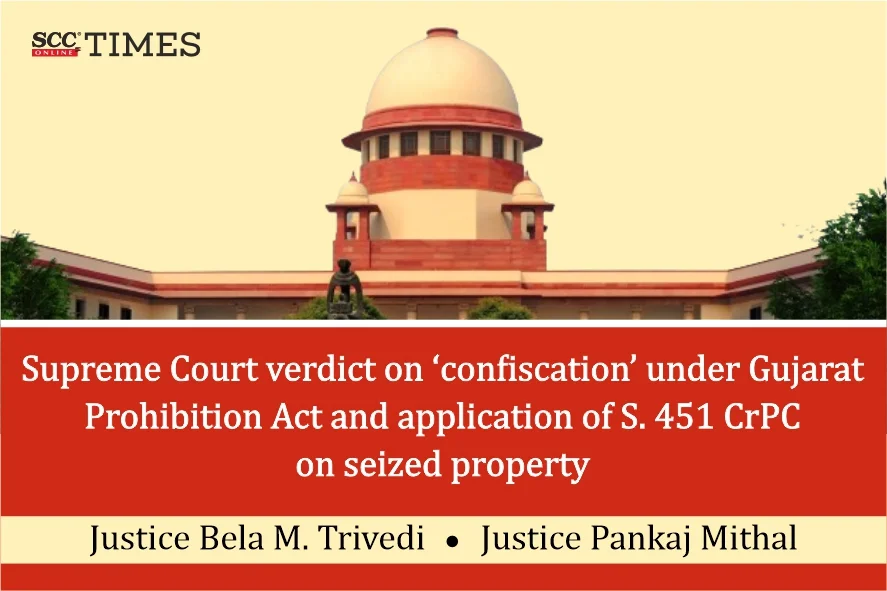Supreme Court: In a criminal appeal against Gujarat High Court’s order, whereby the release of the appellant’s vehicle was refused, the Division Bench of Bela M. Trivedi and Pankaj Mithal, JJ. dismissed the appeal. The Court said that appellant directly approached the High Court by filing Special Criminal Application under Article 226/227 of the Constitution of India, without approaching the Court concerned under Section 451 of the CrPC, which is not the proper course of action for getting the custody of the vehicle in question.
Factual Matrix
In the matter at hand, the appellant’s vehicle was seized in connection with the First Information Report (FIR) for carrying liquor (1240.200 litres) worth of rupees 7 lakhs in the said vehicle without any pass or permit. The offence is under Section 65(a), 65(e), 81, 98(2), 116(2) of the Gujarat Prohibition Act, 1949 (‘the Act’) and section 465, 468, 471, 114 of the Penal Code, 1860 (IPC). The appellant filed an application before the High Court seeking release of the said vehicle. The High Court dismissed application, hence, the present Appeal.
Analysis
The Court perused Section 451 of the Code of Criminal Procedure, 1973 (‘CrPC’) and said that it is the criminal Court before whom the property is produced, which has the jurisdiction and the power to pass appropriate orders for the proper custody of such property or for selling or disposing of such property, having regard to the nature of the property in question, after recording the evidence in that regard.
In the instant case, the Court noted that the appellant directly approached the High Court by filing Special Criminal Application under Article 226/227 of the Constitution of India, without approaching the Court concerned under Section 451 of the CrPC, which is not the proper course of action for getting the custody of the vehicle in question. The Court explained that when there is a specific statutory provision contained in the CrPC empowering the criminal Court to pass appropriate order for the proper custody and disposal of the property pending the inquiry or trial, the appellant could not have invoked the extraordinary jurisdiction of the High Court under Article 226 of the Constitution of India seeking release of his vehicle.
Interpretation of “But” under Section 98 of the Act
Regarding the State’s contention that Section 98(2) of the Act puts an embargo against the release of the vehicle till the final judgment, the Court said that the conjunctive word ‘but’ is perceived to be an embargo against release of the conveyance used for carrying the article liable to be confiscated if the quantity of the seized liquor carried in such conveyance is more than the prescribed quantity, till the final judgment of the Court. The Court explained that when the conjunction “but” is used in a provision, after the punctuation mark “comma”, it is deemed that such conjunction is used to carve out an exception or proviso to the main provision. However, in Section 98(2), though it is in two parts connected with the conjunctive word “but”, there is hardly any co-relation between the first part and the second part thereof. The Court said that considering that the same is not happily worded, the doctrine of harmonious construction is put to use to harmonise the provisions contained therein with the other provisions of the Act and with the provisions contained in the CrPC.
‘Confiscation’ or ‘Seizure’
Going by the dictionary meaning of ‘Confiscation’, the Court said that ‘seizure’ is the preliminary step that would lead to confiscation of an article seized.
For the seizure and confiscation powers, the Court said that provisions with regard to the articles liable to be confiscated and the powers of the Court to confiscate such articles have been incorporated in Section 98 of the Act and the powers of the authorised Prohibition Officer or police officer to arrest the offender and seize the contraband articles are contained in Section 123. The procedure to be followed after the article’s seizure is in Section 132 of the Act.
The Court said that on conjoint reading of the provisions under Section 98 and 132 of the Act and of Section 451 of the CrPC, it is discernible that all these provisions operate in different fields. Section 98 deals with the confiscation of the articles whenever any offence punishable under the Act has been committed. Section 98(2) would come into play when the Prohibition Officer or Police Officer sends the seized article liable to be confiscated but not required as evidence, to the Collector as per Section 132(b). However, Section 451 of the CrPC would come into play when the article property seized during inquiry or investigation is produced before the jurisdictional Court as per Section 132(a) and the Court is called upon to pass appropriate orders for the proper custody of such article/property pending the conclusion of the inquiry or the trial.
Decision
The Court said that in the matter at hand it was unclear whether the seized vehicle was sought to be produced before the Court concerned so as to invoke Section 451 of the CrPC or whether such vehicle was forwarded by the police officer to the Magistrate concerned as contemplated under Section 132(a) of the Act. Hence, the Court dismissed the appeal.
CASE DETAILS
|
Citation: Appellants : Respondents : |
Advocates who appeared in this case For Appellant: For Respondent: |
CORAM :











